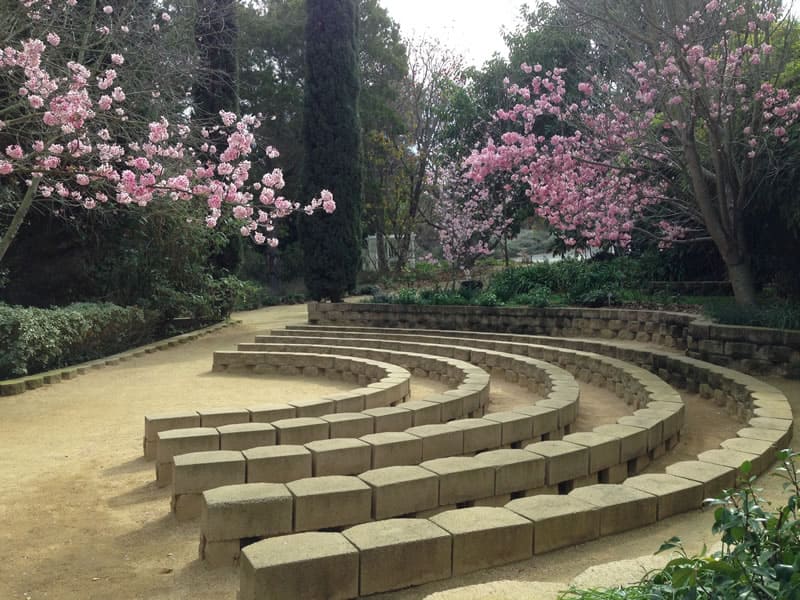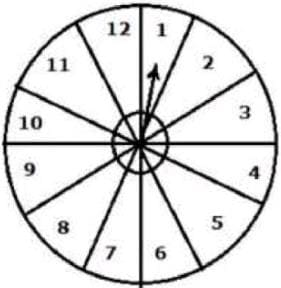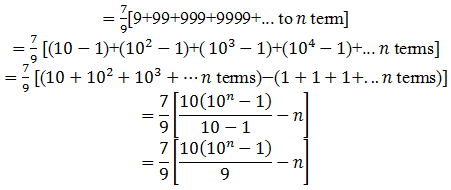Question 1. How many two-digits numbers are divisible by 3?
Solution:
The two-digit numbers divisible by 3 are 12, 15, 18, 99.
Clearly, these number are in AP.
Here, a1=12 and d=15-12=3.
Let this AP contains n terms. Then,
12+(n-1)⋅3=99 …[an=a1+(n-1)d]
3n+9=99
3n=99-9=90
n=30
Hence, there are 30 two-digit numbers divisible by 3.
Q2. How many two digit numbers are divisible by 3?
(a) 25 (b) 30 (c) 32 (d) 36
Solution:
The two-digit numbers divisible by 3 are 12, 15, 18, …, 99.
Clearly, these number are in AP.
Here, a1=12 and d=15-12=3.
Let this AP contains n terms. Then.
[an=a1+(n-1)d]
12+(n-1)⋅3=99
3n+9=99
3n=99-9=90
n=30.
Thus, there are 30 two-digit numbers divisible by 3.
Answer: (b) 30
Q3. How many two-digit number are divisible by 6?
Solution:
The two digit numbers divisible by 6 are 12, I8, 24, …, 96.
Clearly, these number are in AP.
Here, a1=12 and d=18-12=6.
Let this AP contains n terms. Then, an=96
6n+6=96
6n=96-6=90
n=15
Hence, these are 15 two-digit numbers divisible by 6.
Q4. How many three-digit natural numbers are divisible by 7?
Solution:
The three digit natural numbers divisible by 7 are 105, 112, 119 …, 994.
Clearly, these number are in AP.
Here, a1=105 and d=112-105=7.
Let this AP contains n terms. Then,
105+(n-1)⋅7=994 … [an=a1+(n-1)d]
7n+98=994
7n=994-98=986
n=128
Hence, there are 128 three digit numbers divisible by 7.
Q5. How many three-digit natural numbers are divisible by 9?
Solution:
The three-digit natural numbers divisible by 9 are 108, 117, 126, …, 999.
Clearly, these number are in AP.
Here, a1=108 and d=117-108=9
Let this AP contains n terms. Then,
108+(n-1)⋅9=999 … [an=a1+(n-1)d]
9n+99=999
9n=999-99=900
n=100.
Hence, there are 100 three-digit numbers divisible by 9.
Q6. How many three-digit number are divisible by 9?
(a) 86 (b) 90 (c) 96 (d) 100
Solution:
The three-digit numbers divisible by 9 are 108, l17, 126, …, 999.
Clearly, these numbers are in AP.
Here, a1=108 and d=117-108=9.
Let this AP contains n terms. Then,
[an=a1+(n-1)d]
108+(n-1)⋅9=999
9n+99=999
9n=999-99=900
n=100.
Thus, there are 100 three-digit numbers divisible by 9.
Answer: (d) 100
Q7. How many three-digit numbers are divisible by 9?
Solution:
The three-digit numbers divisible by 9 are 108, 117, 126, ….. 999.
Clearly, these number are in AP.
Here. a1=108 and d=117-108=9.
Let this AP contains n terms. Then.
108+(n-1)×9=999… [an=a1+(n-1)d]
9n+99=999
9n=999-99=900
n=100
Hence, there are 100 three-digit numbers divisible by 9.
Q8. How many numbers are there between 101 and 999, which are divisible by both 2 and 5?
Solution:
The numbers which are divisible by both 2 and 5 are divisible by 10 also.
Now, the numbers between 101 and 999 which are divisible 10 are 110, 120, 130, …, 990.
Clearly, these number are in AP
Here, a1=110 and d=120-110=10.
Let this AP contains n terms. Then,
110+(n-1)⋅10=990… [an=a1+(n-1)d]
10n+100=990
10n=990-100=890
n=89.
Hence, there are 89 numbers between 101 and 999 which are divisible by both 2 and 5.
Calculating Sums
Example 1: Find the Sum of an Arithmetic Series
Find the sum of the first 100 positive integers.
The series is 1+2+3+ …+100. Since you can see that a1=1, a100=100, and d=1, you can use either sum formula for this series.
| Method 1 | Method 2 | |
|---|---|---|
| Sn=½n(a1+an ) | Sum formula | Sn=½n[2a1+(n-1)d] |
| S100=½⋅100⋅(1+100) | n=100, a1=1, a100=100, d=1 | S100=½⋅100⋅[2(1)+(100-1)1] |
| S100=50(101) | Simplify. | S100=50(101) |
| S100=5050 | Multiply. | S100=5050 |
The sum of the first 100 positive integers is 5050.
Ex2. Given the arithmetic sequence -3, 1, 5, …, 393
a) Determine a formula for the nth term of the sequence.
b) Write down the 4th, 5th, 6th and 7th terms of the sequence.
c) Write down the remainders when each of the first seven terms of the sequence is divided by 3.
d) Calculate the sum of the terms in the arithmetic sequence that are divisible by 3.
Solution:
a) an=-3+(n-1)⋅4
b) a4=5+4=9, a5=9+4=13, a6=13+4=17 and a7=17+4=21
c) 0, 1, 2, 0, 1, 2, 0
d) an=-3+12(n-1)
12n=393+15=408
n=34
S34=½⋅34⋅(-3+393)
=17×390 =6630
Ex3. Find the sum of all natural numbers from 1 to 500 which are divisible by 3.
Solution:
The sequence of numbers divisible by 3 is 3, 6, 9, 12, …, 498 (which is in A.P.) Here a1=3, d=6-3=3, n=? an=498
First we find n For this using an=a1+(n-1)d
498=3+3n-3
3n=498
n=166
Now a1=3, d=3, n=166, Sn=?
S166=½⋅166⋅[2⋅3+(166-1)⋅3]
=83⋅[6+165⋅3]=83⋅(6+495)
=83×501
S166=41583
Ex4. Find the sum of the first 40 positive integers divisible by 6.
Solution:
The first 40 positive integers divisible by 6 are 6, 12, 18, …, 240.
Here, a1=6, d=12-6=6 and n=40. The sum of n terms of an AP is given by
S40=½⋅40⋅[2⋅6+(40-1)⋅6]
=20[12+234]
=20(246)=4920
Hence, the sum of the first 40 positive integers divisible by 6 is 4920.
Ex5. Find the sum of the first 15 multiples of 8.
Solution:
The first 15 multiples of 8 are 8, 16, 24, …, 120.
Here, a1=8, d=16-8=8 and n=15.
The sum of n terms of an AP is given by
S15=½⋅15⋅[2⋅8+(15-1)⋅8]
=15⋅½⋅(16+112)
=15⋅½⋅128
=15⋅64=960
Hence, the sum of the first 15 multiples of 8 is 960.
Ex6. Find the sum of all natural numbers lying between 100 and 1000, which are multiples of 5.
Solution:
The natural numbers lying between 100 and 1000, which are multiples of 5, are 105, 110, …, 995.
Here. a1=105 and d=5.
105+(n-1)5=995
(n-1)5=995-105=890
n-1=178
n=179
S179=½⋅179⋅[2(105)+(179-1)(5)]
=½⋅179⋅[2(105)+(173)(5)]
=179[105+(89)5]
=(179)(105+445)
=(179)(550)
=98450
Thus, the sum of all natural numbers lying between 100 and 1000, which are multiples of 5, is 98450.
Ex7. Find the sum of all numbers between 200 and 400 which are divisible by 7.
Solution:
The numbers lying between 200 and 400, which are divisible by 7, are 203, 210, 217, …, 399.
∴ First term a1=203, last term, ℓ=399, common difference d=7.
Let the number of terms of the A.P. be n.
399=203+(n-1)7
7(n-1)=196
n-1=28
n=29.
S29=½⋅29⋅(203+399)
=29/2⋅602=29⋅301
=8729
Thus, the required sum is 8729.
Ex8. Find the sum of all natural numbers between 200 and 400 which are divisible by 7. Solution:
Natural numbers between 200 and 400 which are divisible by 7 are 203, 210 , …, 399.
This is an AP with a1=203, d=7 and ℓ=399.
Suppose there are n terms in the AP. Then, an=399.
7n+196=399
7n=399-196=203
n=29
∴ Required sum =½⋅(203+399)… Sn=½n(a+ℓ)
=8729
Hence, the required sum is 8729.
Ex9. Find the sum of first forty positive integers divisible by 6.
Solution:
The positive integers divisible by 6 are 6, 12, 18, … .
This is an AP with a1=6 and d=6. Also, n=40 (Given)
Using the formula, Sn=½n[2a1+(n-1)d], we get
=20⋅(12+234)
=20⋅246
=4920.
Hence, the required sum is 4920.
Ex10. Find the sum of first 15 multiples of 8.
Solution:
The first 15 multiples of 8 are 8, 16, 24, 32, … .
This is an AP in which a1=8, d=(16-8)=8 and n=15. Thus, we have:
=8+(15-1)⋅8
=120
∴ Required sum =½n(a+ℓ)
Hence, the required sum is 960.
Ex11. Find the sum of all multiples of 9 lying between 300 and 700.
Solution:
The multiples of 9 lying between 300 and 700 are 306, 315, …, 693.
This is an AP with a1=306, d=9 and ℓ=693..
Suppose these are n terms in the AP. Then, an=693.
9n+297=693
9n=693-297=396
n=44
∴ Required sum =½⋅44⋅(306+693)
=21978
Hence, the required sum is 21978.
Ex12. Find the sum of first 100 even number which are divisible by 5.
Solution:
The first few even natural numbers which are divisible by 5 are 10, 20, 30, 40, … .
This is an AP in which a1=10, d=(20-10)=10 and n=100.
The sum of n terms of an AP is given by
[a=10, d=10 and n=100]
S100=½⋅100⋅[2⋅10+(100-1)⋅10]
=50⋅[20+990]=50⋅1010=50500
Hence, the sum of the first hundred even natural numbers which are divisible by 5 is 50500.
Ex13. The sum of first 40 positive integers divisible by 6 is
(a) 2460 (b) 3640 (c) 4920 (d) 4860
Answer: (c) 4920
Solution:
The positive integers divisible by 6 are 6, 12, l8, … .
This is an AP with a1=6 and d=6.
Also, n=40 (Given)
Using the formula, Sn=½n[2a1+(n-1)d], we get
=20⋅(12+234)
=20⋅(12+234)
=20⋅246
=4920.
Thus, the required sum is 4920.
Ex14. Find the sum of integers from 1 to 100 that are divisible by 2 or 5.
Solution:
The integers from 1 to 100, which are divisible by 2, are 2, 4, 6, …, 100.
In this forms an A.P., the first term and common difference are equal to 2.
∴2+4+6+⋯+100=½⋅50⋅[2⋅2+2(50-1)]
S50=25⋅[4+98]=25⋅102
=2550
The integers from 1 to 100, which are divisible by 5, are 5, 10, …, 100. This forms an A.P. with both the first term and common difference equal to 5.
5n=100
n=20
∴5+10+⋯+100=½⋅20⋅[2⋅5+5(20-1)]
=10⋅[10+95]=10⋅105=1050
The integers, which are divisible by both 2 and 5, are 10, 20, …, 100.
This also forms an A.P. with both the first term and common difference equal to 10.
100=10n
n=10
∴10+20+⋯+100=½⋅10⋅[2(10)+(10-1)(10)]
=5⋅[20+90]=5⋅110=550
∴ Required sum =2550+1050-550=3050.
Thus, the sum of the integers from 1 to 100, which are divisible by 2 or 5, is 3050.
Ex15. Find the sum of all two digit numbers which when divided by 4, yields 1 as remainder.
Solution:
The two-digit numbers, which when divided by 4, yield 1 as remainder, are 13, 17, …, 97.
This series forms an A.P. with first term 13 and common difference 4.
Let n be the number of terms of the A.P.
It is known that the nth term of an A.P. is given by, an=a1+(n-1)d
4(n-1)=84
n-1=21
n=22.
Sum of n terms of an A.P. is given by,
∴S22=½⋅22⋅[2⋅13+4(22-1)]
=11⋅[26+84]
=1210
Thus, the required sum is 1210.
Ex16. Find the sum of all three-digits natural numbers which are divisible by 13.
Solution:
All three-digit numbers which are divisible by 13 are 104, 117, I30, 143, …, 938.
This is an AP in which a1=104, d=(117-104)=13 and ℓ=938.
Let the number of terms be n. Then an=938.
104+(n-1)⋅13=988
13n=897
n=69
∴ Required sum =½n(a+ℓ)
Hence, the required sum is 37674.





1 comment on Numbers which are divisible by or multiples of an integer in Arithmetic Sequence